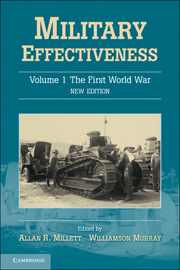Book contents
- Frontmatter
- Contents
- List of Contributors
- Preface to the First Edition
- Introduction: Military Effectiveness Twenty Years After
- Maps
- 1 The Effectiveness of Military Organization
- 2 Britain in the First World War
- 3 The Dynamics of Necessity: German Military Policy during the First World War
- 4 American Military Effectiveness in the First World War
- 5 Italy during the First World War
- 6 The French Army in the First World War
- 7 Japan, 1914–18
- 8 Imperial Russia's Forces at War
- 9 Military Effectiveness in the First World War
- Index
2 - Britain in the First World War
Published online by Cambridge University Press: 05 June 2012
- Frontmatter
- Contents
- List of Contributors
- Preface to the First Edition
- Introduction: Military Effectiveness Twenty Years After
- Maps
- 1 The Effectiveness of Military Organization
- 2 Britain in the First World War
- 3 The Dynamics of Necessity: German Military Policy during the First World War
- 4 American Military Effectiveness in the First World War
- 5 Italy during the First World War
- 6 The French Army in the First World War
- 7 Japan, 1914–18
- 8 Imperial Russia's Forces at War
- 9 Military Effectiveness in the First World War
- Index
Summary
Introduction
The performance of Great Britain and its fighting services during the 1914–18 conflict offers an excellent example of the various categories by which military effectiveness can be assessed, and of the marked discrepancies which may exist in a nation's ability to be effective at all levels. As many historians have pointed out, a country such as twentieth-century Germany was able to produce a military system which was extremely flexible, resourceful, and therefore very effective in operational and tactical terms, but all this was vitiated by persistent failures at the political and strategical level. By contrast, as the following essay will seek to show, the British were not particularly effective at the ‘sharp end’ of battle fighting, and (at least in the First World War) were slow to discover ways of improving their operational performance. Yet they were much better at the level of grand strategy, having evolved a politico-strategic process which could exploit the country's natural advantages, take into account the larger purposes of this complex and geographically disparate war, and try to balance means against ends.
The strong points of the British system could, therefore, help to mitigate the weaknesses which were being exposed at the operational and tactical level; but they could not of course eliminate those weaknesses, since no amount of political wisdom or strategic finesse can secure victory if a country's armed forces are ineffective on the battlefield.
- Type
- Chapter
- Information
- Military Effectiveness , pp. 31 - 79Publisher: Cambridge University PressPrint publication year: 2010



